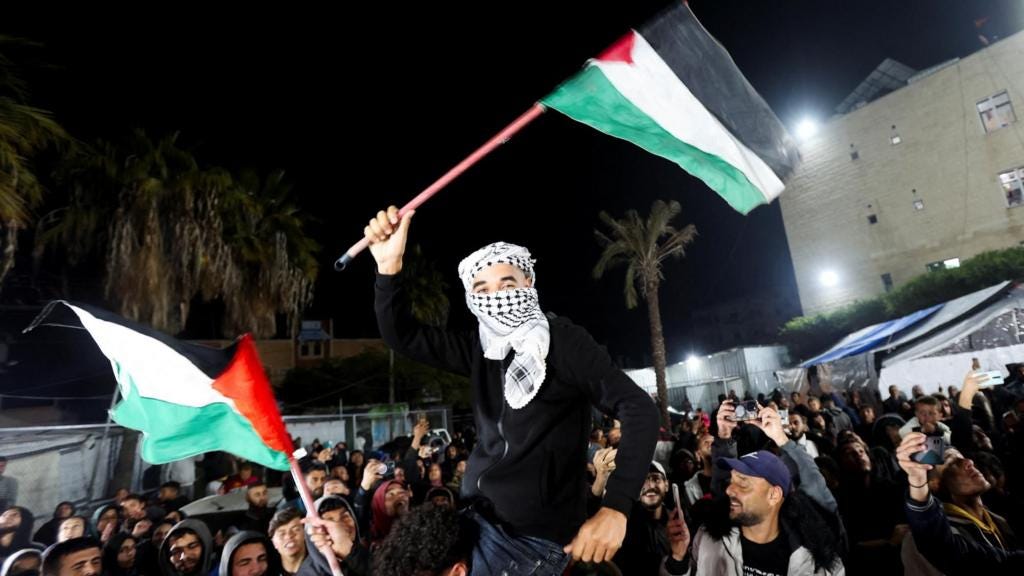Israel And Hamas Reached A Ceasefire Agreement
Too late in many terms, but a piece of good news nonetheless
Finally, some good news!
After numerous false hopes and backtracks, Israel and Hamas has agreed to a ceasefire deal after more than a year and a half of war, killing more than 1100 Israelis and 46,000 Palestinians.
Qatar’s Prime Minister Sheikh Mohammed bin Abdulrahman Al Thani announced the long-awaited news and told reporters the deal would go into effect on Sunday, jubilation in both Israel and Palestine after the news broke despite lingering concerns.
In the first stage of the ceasefire deal, the Israeli military will withdraw to within 700 meters inside Gaza, Israel will release about 2000 prisoners and Hamas will release 33 hostages, Israel will allow injured Gazans to travel to receive medical treatment and open the Rafah crossing with Egypt, and Israeli forces will begin to pull back from the Philadelphi Corridor before fully withdrawing in later stages.
If Israel determines the conditions are met, Hamas will release all the remaining living captives and in return, more Palestinians will be freed in the Israeli prison system. Israel will initiate its “complete withdrawal” from Gaza under a three to five-year reconstruction plan. The only issue is there is no agreement over who will administer Gaza post-ceasefire. Still, the US has pressed for a reformed version of the Palestinian authority to do so.
International figures like UN Secretary-General António Guterres praised the deal, posting on social media “I urge the parties and relevant partners to seize this opportunity to establish a credible political path to a better future for Palestinians, Israelis & the broader region. Ending the occupation & achieving a negotiated two-state solution, with Israel & Palestine living side by side in peace & security, in line with international law, relevant UN resolutions, and previous agreements remain an urgent priority. Only through a viable two-state solution can the aspirations of both peoples be fulfilled.”
German Chancellor Scholz welcomed the deal and said it “must be implemented to the letter," Spanish Prime Minister Pedro Sanchez said the agreement was "crucial" to achieving regional stability, the UN High Commissioner for Human Rights Volker Turk said the promise of "huge relief after so much unbearable pain and misery” lies on the ceasefire and it is “imperative” that it stays that way, US progressive Senator Bernie Sanders celebrated the “welcome, long-overdue news,” Turkey’s President Recep Tayip Erdogan expressed his government’s hope that “the agreement will be beneficial for our region and all of humanity, especially our Palestinian brothers, and that it will open the door to lasting peace and stability,” EU Commissioner Ursula von der Leyen said the agreement "brings hope to an entire region, where people have endured immense suffering for far too long."
As expected, Donald Trump swooped in to take credit, noting how his return to office forced a deal to materialize. He wrote on social media: “This EPIC ceasefire agreement could have only happened as a result of our Historic Victory in November, as it signaled to the entire World that my Administration would seek Peace and negotiate deals to ensure the safety of all Americans, and our Allies. I am thrilled American and Israeli hostages will be returning home to be reunited with their families and loved ones.”
Biden took credit as well, albeit more humbly. He first released a statement noting “It is the result not only of the extreme pressure that Hamas has been under and the changed regional equation after a ceasefire in Lebanon and weakening of Iran — but also of dogged and painstaking American diplomacy. My diplomacy never ceased in their efforts to get this done.” Then in a public address, the president said “For the past few days, we have been speaking as one team” when referring to efforts made by both diplomatic teams from the Biden administration and the Trump transition. For bonus points, Biden said Israel will negotiate a “permanent end to war.”
Politically, the race is on to define which president did more to cement the ceasefire. Some can rightfully argue Trump’s return to power certainly sped up the ceasefire process, and his threats seemed to be useful in pushing both sides to the table. However, it should also be noted Netanyahu has repeatedly obstructed ceasefire deals in the past, with some suspecting it was due to political reasons including postponing it until after the US election. Like with the release of Russian prisoners like WSJ journalist Evan Gershkovich, Biden’s team played a exhausting and major role in getting both sides to sign an agreement. They deserve much credit, even if they might get very little.
In Israel, Netanyahu tried to refuse to accept the ceasefire deal, but Israel’s President Isaac Herzog publicly called on the Prime Minister to approve the ceasefire. For journalists within Gaza, it was a huge relief, evident when Al Jazeera Arabic’s correspondent Anas al-Sharif removed his flak jacket and helmet when announcing the deal.
The Committee to Protect Journalists welcomed the ceasefire deal and called for media access and war crimes investigations, CPJ CEO Jodie Ginsberg said: “Journalists have been paying the highest price – with their lives – to provide the world some insight into the horrors that have been taking place in Gaza during this prolonged war, which has decimated a generation of Palestinian reporters and newsrooms. We call on Egyptian, Palestinian, and Israeli authorities to immediately allow foreign journalists into Gaza, and on the international community to independently investigate the deliberate targeting of journalists that has been widely documented since October 2023.”
Much is uncertain about Gaza’s future, and we were here before with previous ceasefires being set up and broken down after time. But for now, let’s be happy that the war has stopped for now.




